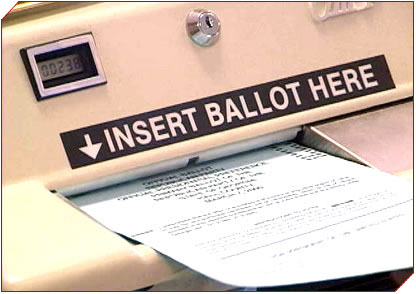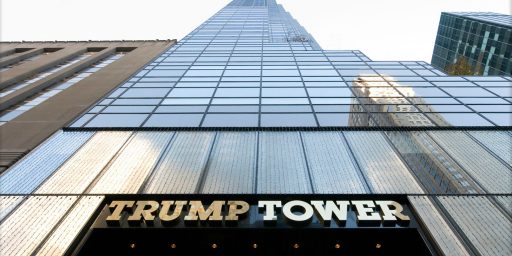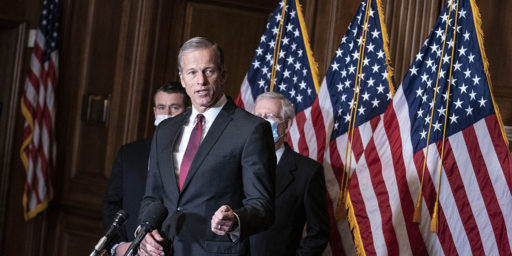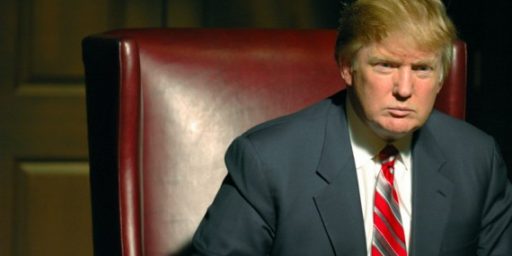Voting in America: Too Much Democracy?
 Jonathan Bernstein reflects on his getting to vote for 52 separate ballot lines yesterday in Texas, with contests ranging from governor to dog catcher.
Jonathan Bernstein reflects on his getting to vote for 52 separate ballot lines yesterday in Texas, with contests ranging from governor to dog catcher.
I love elections, and I do believe that one mark of a strong democracy is keeping the politicians, and not bureaucracies, in charge of lots of things.
But this is ridiculous. The correct word for most of the elections that happened in Texas today, and that happen in primary elections around the nation all spring and summer this year, is farce. No one has any idea what they’re doing (especially in primaries, and in nonpartisan elections, in which you don’t even get a useful cue about what to do). I like the idea that Americans vote more often and for more things that just about any other nation, but we could vote for about a third of what we vote for now and still be very high on the scale, and people wouldn’t have to feel like idiots on election day.
As someone who also considers himself reasonably well informed regarding politics and yet frequently finds myself not having the slightest clue as to how to differentiate down-ballot candidates, I concur.
But beyond the fact that it’s unreasonable to expect that voters will spend the time learning about hundreds of candidates is the more fundamental question of which offices ought to be directly accountable to the public. Key policymakers — presidents, governors, mayors, legislators, and the like — are obvious. I’m less certain about even high level secondary players like lieutenant governors, attorneys general, secretaries of state, state treasurers, and the like. At the federal level, they’re all appointees who answer to the chief executive but most states elect them. My preference is for the latter but I don’t have strong feelings on the matter.
What I’ve never understood is why we elect administrative officials like agriculture commissioners, transportation officials, coroners, dog catchers, and such. But a lot of municipalities do. That seems to me to be asking for corruption, conflicts of interest, and sheer incompetence.
Further, as I noted yesterday, I’m leery of electing key people in the criminal justice system — judges, prosecutors, and sheriffs are the most common cases. Not only don’t we want these people beholden to campaign contributors, having partisan loyalties, and other apparent conflicts of interest but we really don’t want them making day-to-day decisions based on public opinion.






Please see my comment above. Joyner for dawg-catcha!
I know why we have such long ballots in Texas. It all traces back to the aftermath of the War of Northern Aggression. When Texas was occupied after the war, it was not the most pleasant of situations for most Texans. When Grant refused to allow the use of federal troops to overturn an election, the occupation by fiat essentially ended. In a reaction to this, the new legislature made it so just about every office was elected. We also have an extensive constitution that requires voter approval to change.
I remember several years ago voting to eliminate the position of county hide bounty payer (I forget the exact title) that was an elected position specifically to pay out on coyote hides brought in as part of varmint control. Given the number of years it had been since someone had actually tried to turn in a coyote hide, I thought it was reasonable to vote to eliminate the job for our county. About a third of the voters didn’t agree.
The push for local electoral control is strong enough that Dallas actually voted to be wet or dry on the precinct level. So you can drive through 8 blocks of a dry precinct and find liquor stores across the street at either end.
We also had the case of an unelected city traffic manager who refused to spend approved voter bond money to improve traffic flow because she said it would encourage people to drive cars and thus discourage people to ride mass transit. She wasn’t directly elected, so we had to go after a mayor and 6 commissioners to get her out of the job.
I’m not sure how being appointed by an elected politician prevents corruption. Also if you centralized power, the chances of a corrupt person gaining that power and corrupting the who system is far greater. For example if you elect a Mayor and have him appoint the Sheriff, County Clerk, etc. One corrupt mayor can corrupt the whole system. He would have control of elections, law enforcement, accounting etc.
Local Sheriff, dog catcher, etc work as servants of the local people. They should reflect those people not some party leader in Washington.
You will miss having “too much democracy” when you have none.
I am not convinced either that appointments would prevent corruption, but there are some jobs that probably don’t need to be elected positions that are.
We don’t really have tons of local elected offices and I also like the fact that our state doesn’t really do too many ballot initiative type stuff, and then it only pertains to funding/bond type stuff. We do not put things like gay marriage or college funds for illegal immigrants on the ballot. We do however have one of the largest state legislatures (may be the largest but I don’t remember for certain) for such a tiny state.
Our local elections are also non partisan-I am still not sure whether I like this or not, but at least it avoids one party running the show.
I think it’s a legacy of when towns and populations in general were a lot smaller.
On a side-note,
“War of Northern Aggression”? Is that what they call it when a bunch of states tears the Union apart because of bitching over a legitimately won election and their “right” to enslave other people?
Awwww, that’s cute…are you sad that those “Northern Aggressors” won?
Yeah, that’s what they call it.
Here in California we have an ass-load of democracy. Lots and lots of democracy. Oh boy, do we have us some democracy.
And if you set aside the fact that we are bankrupt, our prisons are full of people serving life sentences for shoplifting, every single building in the entire state is labeled with a toxic substances warning, our schools are on a par with those in Albania, our legislature is entirely manned by circus clowns and our governor can’t even say the world “California” we’re doing great.